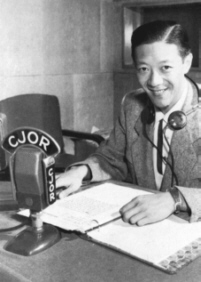
The Yo-Yo King of Chinatown dies at 90
By John Mackie, Vancouver Sun
March 14, 2009
They called Harvey Lowe a Chinatown legend, but that was something of an understatement.
Lowe hosted Canada's first Chinese-language radio show, was a nightclub fixture in the 1950s and '60s at clubs like the Marco Polo and the Smilin' Buddha, and a restaurateur who was involved with Chinatown hot spots like the Bamboo Terrace, the Kingsland and the Asia Gardens.
He was also the doorman at one of Chinatown's fabled gambling dens, taught Julie Christie how to smoke opium for the movie McCabe and Mrs. Miller and was once a regular on the Smothers Brothers TV show.
But his main claim to fame was as a yo-yo player. In September 1932, Lowe won the World Yo-Yo Championship in London, England. He took a $4,600 prize, and lived in London for three years, doing yo-yo exhibitions around Europe.
He visited the Eiffel Tower so often the guards would let "the little China boy" in for free. His manager insured his hands with Lloyds of London (as a gimmick: his hands were insured for only a day), and he taught the Prince of Wales (later King Edward VIII) yo-yo tricks.
"Somebody has a picture of him playing yo-yo with me, the royal photographer," Lowe said in a 2003 interview with The Vancouver Sun.
"We tried to get that picture, but dammit, they wouldn't give it to us, because we wanted to use it for advertising."
Lowe died Wednesday at St. Paul's Hospital. He was 90.
Teaching yo-yo to a future king was a far cry from his childhood in Victoria, where he was born on Oct. 30, 1918, the 10th child of Lowe Gee Quai and Ming Yook.
His father was one of three brothers who set up tailor shops on Government Street in the 1890s. Through a bizarre immigration mix-up, all three were given the same English first name, Charlie, but were given different last names: Lowe, Hope and Wu.
Lowe's father died when he was three, and his mother supported the family by sewing. He was largely brought up by his father's concubine or mistress, who lived in the same house as the rest of the family.
"The Chinese want sons, so [my father] had a concubine," he said, noting that his mother had eight girls but only two sons.
"Imagine, both of them were living under the same roof. But they got along good. The concubine was the one that looked after me. The first mother gave birth to 10, and I had one [younger] brother from the concubine, so I was No. 11."
Harvey's fortune changed during the continental yo-yo craze of the late 1920s and early 1930s. In 1931, Lowe bought his first yo-yo for 35 cents, and he was soon winning local contests.
"I had badges and wound up with a bicycle," he recounted. "Man, that was like winning a Cadillac in 1931."
He was so good, promoter Irving Cook offered to take him to London. Lowe won the World Yo-Yo Championship on Sept. 12, 1932 at the Empire Theatre in London. At the height of his yo-yo powers, he figures he could do 2,000 different tricks with his Cheerio yo-yo, which is now in the National Yo-Yo Museum in Chico, Calif.
In late 1934, he returned to Victoria and high school. But his mother sent him to Shanghai in 1937 so he could learn to write Mandarin. He lived through the Japanese occupation there during the Second World War, but in 1949 left China when Mao Tse-tung's Communists took over.
Back in Vancouver, he got a job as a doorman at the Dye Ning gambling club in the 100 block of East Pender.
"Five or six" gambling houses operated in Chinatown at the time as social clubs. Lowe said the attitude of the authorities was simple: "You can gamble all you want among you Chinamen, as long as you don't let the English in."
It was an easy job.
"All I'd do was watch the door and let the members in. Non-members are white," he laughed."As soon as reporters would come, I used to fake [not speaking English]. 'No can come in, sorry, sorry. No can come in.' So they don't talk long with me. 'No speak.' They'd all laugh and walk away."
He bought a typewriter and started writing stories about China, which he showed to Jack Short at radio station CJOR.
He wound up doing a half-hour show, Call of China, for 12 years.
In the early 1950s he opened the Smilin' Buddha Cabaret on Hastings Street, and in the 1960s he was stage manager at the Marco Polo, one of Vancouver's top nightclubs. In later years he worked as a greeter for Canadian Pacific Airlines at the airport, was president of the Chinatown Lions Club and worked in public relations for Aberdeen Mall in Richmond.
He was a one-off, a man with a seemingly endless supply of energy. In 1995 he had surgery to deal with a tumour "like a small golf ball" in his brain. Taking the tumour out was deemed too risky, so doctors "cleaned up" his brain the best they could in a 10-hour operation.
The surgery was successful, but left a lingering problem: memory loss. Lowe coped with it the best way he knew how: by doing yo-yo tricks. And after a month, his memory returned.
jmackie@vancouversun.com



No comments:
Post a Comment